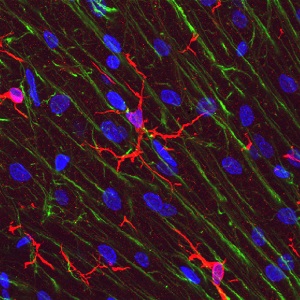Molecular Neuroscience

Molecular approaches are used in approximately half of the neuroscience research programs at the University of Maryland. While most of these labs employ standard molecular biological techniques to over-express, knock-down, explore structure-function relationships, map, and mutagenize neuronal proteins, modern molecular techniques are also used in many cutting-edge approaches to problems of neurobiological interest, for example, using viral vectors to explore neuronal cell death and signaling; molecular tagging to study neuronal protein trafficking and construct novel biosensors; examining differential gene expression in neuronal disease; and cloning cDNAs encoding molecules found to associate with known markers of neurodegenerative disease.
Molecular techniques are also often used to generate animal models for a variety of neuronal diseases and processes. Examples studied here at Maryland are transgenic mice which express Alzheimer’s disease proteins in their brains, mice which exhibit deficits in circadian rhythm, mice with lowered amounts of a gene associated with bipolar disease, and mice with triplication of chromosome 16, a model for human Down’s syndrome, to name just a few.
One of the newest molecular techniques used at the University of Maryland is the molecular manipulation of behavioral and electrophysiological circuits through optogenetics, a technique in which neural circuits are probed using light-activated channels introduced either via viral vectors or by cell-specific genetic strategies. These emerging techniques permit millisecond activation of distinct neuronal networks and can link specific circuits and specific molecules to distinct cellular and even animal behaviors.
Taken together, modern molecular techniques have the potential to solve a broad array of problems in neuroscience, ranging from cell biological (where in the neuron does this protein work? what synapses are affected?) to behavioral (what behavior is associated with which brain circuit?) The knowledge gained in the coming years through the application of emergent molecular techniques to neuroscience will address the molecular bases for many debilitating brain diseases which are now only very poorly understood, for example, neurodegeneration, schizophrenia and autism.



































